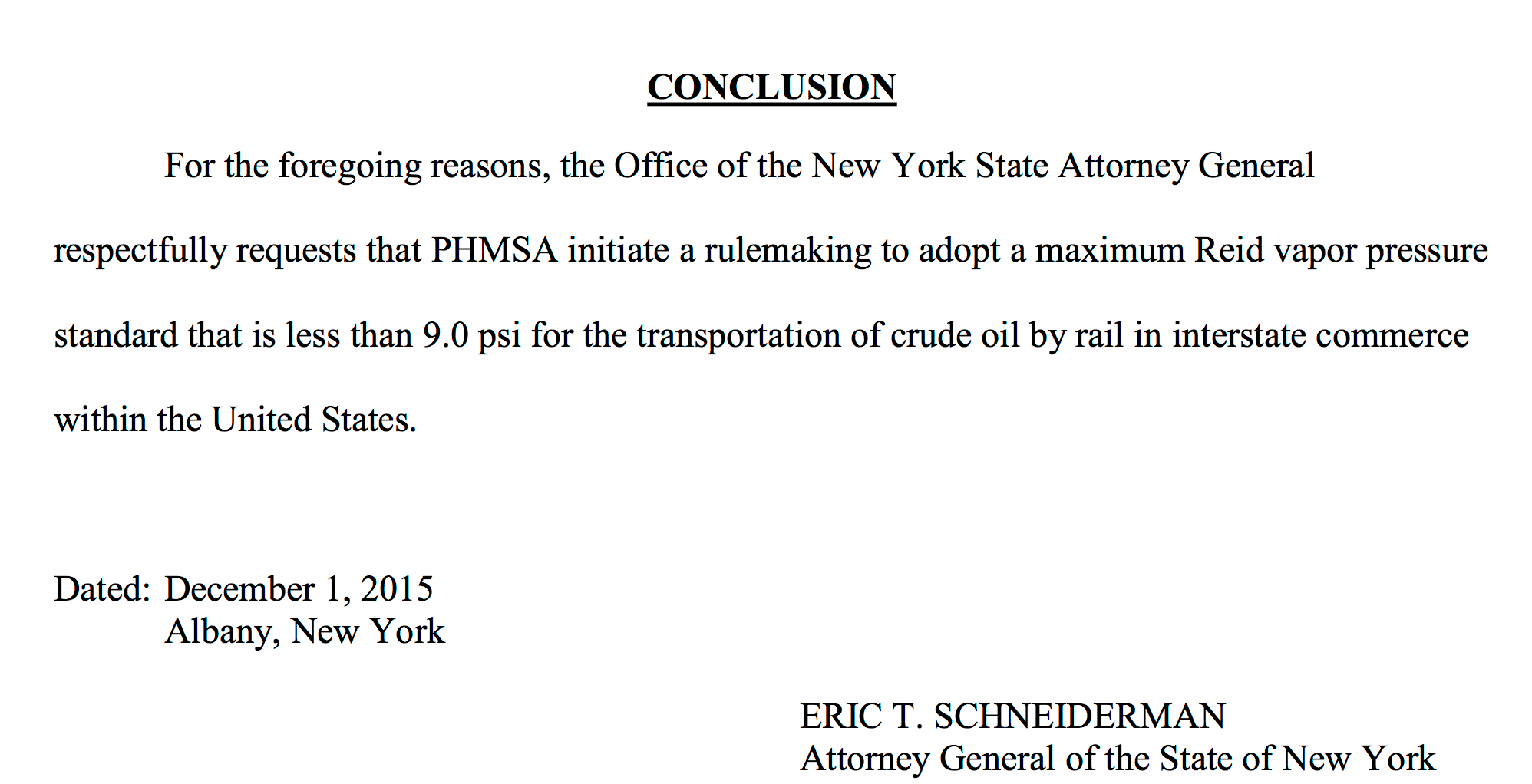New York Attorney General Eric Schneiderman’s recent petition to the Pipeline and Hazardous Materials Safety Administration to require oil producers to stabilize oil before it is shipped by rail is a detailed 30-page document. However, the essence of the document is summed up in a single sentence (found on page 24).
“Without rulemaking on vapor pressure, current Federal standards will not prevent high intensity fires and explosions in future train accidents.”
Vapor pressure is a characteristic of oil used to quantify oil’s volatility and is correlated to the amount of natural gas liquids present in the crude oil mixture. The more natural gas liquids, the higher the vapor pressure.
The high percentage of natural gas liquids (e.g. propane and butane) in the Bakken oil are what make it so volatile and flammable.
As repeatedly noted by DeSmog, with the new regulations failing to address the volatility of the oil, the risk of “bomb train” accidents remains.
Schneiderman’s petition is asking that regulations require the oil to be stabilized to achieve a Reid vapor pressure of no greater than 9 psi. Stabilization is the process that removes the natural gas liquids from the crude oil mixture and lowers the vapor pressure.
While it is debatable whether 9 psi is a sufficiently low enough vapor pressure to remove all risk of oil train fires, it does match the current levels that the oil pipeline operators require for shipping oil by pipeline.
The only existing regulation for vapor pressure for oil-by-rail shipment is North Dakota’s state standard of 13.7 psi. As noted in this DeSmog piece which described the North Dakota regulations as “meaningless,” Schneiderman’s petition notes that this is insufficient since it is a significantly higher vapor pressure than the oil involved in most recent major oil-by-rail fires. The oil samples in the Lac-Megantic disaster were close to 10 psi.
Predictably, as reported by the Albany Times Union, the immediate response by the American Petroleum Institute to the petition was from spokesperson Sabrina Fang stating that “[vapor pressure] is a poor parameter for crude oil transport classification and solely using vapor pressure as a metric could lead to erroneous results.”
Fang didn’t elaborate on why vapor pressure is a perfectly acceptable parameter for oil transportation by pipeline – one the oil industry chooses to use.
Earlier this year the pipeline operator Plains All American warned suppliers that the oil had become “too light.” How was it determined the oil was too light? By measuring the vapor pressure which in the article Reuters describes as “a measure of volatility in oil or refined fuels.”
Of course, Sabrina Fang is a public relations expert, not a scientist. An actual oil scientist provided a very different viewpoint on vapor pressure to Al Jazeera earlier this year.
“The notion that this requires significant research and development is a bunch of BS,” said Ramanan Krishnamoorti, a professor of petroleum engineering at the University of Houston. “The science behind this has been revealed over 80 years ago, and developing a simple spreadsheet to calculate risk based on composition and vapor pressure is trivial. This can be done today.”
Earlier this year, DeSmog produced this video on the science of Bakken oil and highlighted the efforts of politicians and bureaucrats to cast doubt on the science of oil stabilization, vapor pressure and volatility.
The reality is that the science is clear that reducing the natural gas liquids via stabilization reduces the volatility of the oil — and thus reduces the risk of fires and explosions.
However, stabilization of the oil would require investment in infrastructure by the oil producers in North Dakota. And they are refusing to invest in the equipment. This point is made in the petition with a quote from the Wall Street Journal’s Russell Gold from an interview on National Public Radio.
“Well, it’s not very expensive at all – it’s cents on the barrel. And it’s really not very difficult to do this. And if you look at a place like Texas, quite regularly they’ll use a combination of heat and pressure to separate out the gases at the well site. But in North Dakota, that does not happen as much. There’s no infrastructure to do anything with the gas, so the oil producers prefer to keep the gas in the oil and just ship it to markets.”
Not very expensive. Not very difficult. Done in Texas. But “the oil producers prefer to keep the gas in the oil and just ship it to markets.”
As reported by DeSmog, by leaving the natural gas liquids in the crude oil, it also makes the oil more valuable.
In testimony to the North Dakota Industrial Commission about the proposed vapor pressure regulations, Tony Lucero of oil producer Enerplus said: “The flammable characteristics of our product are actually a big piece of why this product is so valuable. That is why we can make these very valuable products like gasoline and jet fuel.”
The oil industry spent decades challenging known science about the impact of fossil fuel consumption on the global climate. That strategy is being repeated regarding the known science of crude oil volatility and vapor pressure.
With Schneiderman’s petition as a starting point, perhaps it won’t take decades for regulators to apply known science and require oil stabilization. That would greatly reduce the risk posed by oil trains to the 25 million people living along the tracks.
Subscribe to our newsletter
Stay up to date with DeSmog news and alerts







